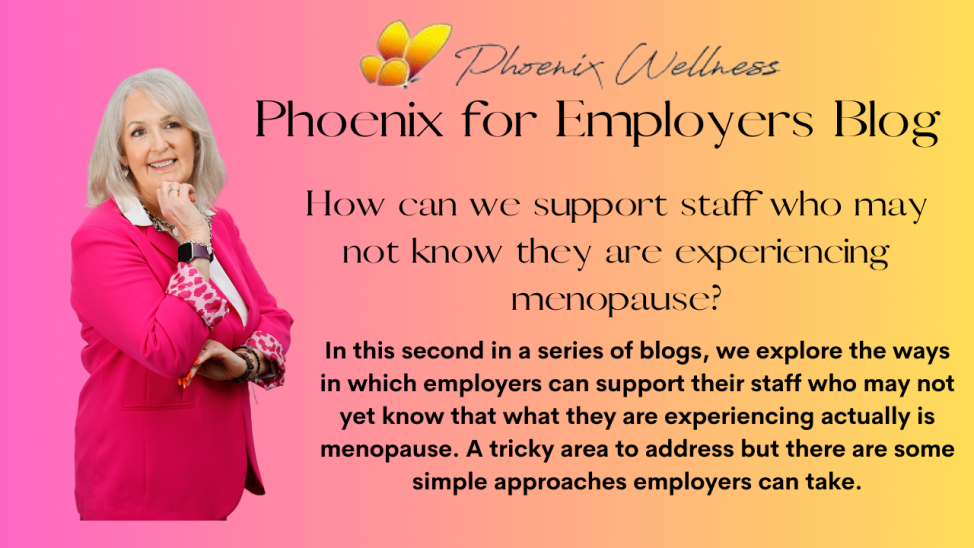
Welcome to our Phoenix for Employers Blog by Phoenix Wellness Coaching. I am a regular blogger and have a YouTube channel that supports women experiencing menopause, but I recognise we need a different approach to help employers, and to this end, I launched my employers’ blog. In this monthly blog I will provide you with some practical ways in which you can build a supportive culture of care that enables staff to discuss menopause, empowering them to seek the support they need so that your organisation can retain the skills, knowledge and expertise of these women for longer.
Alongside these blogs I have launched a bi-monthly Phoenix for Employers Forum which is an online discussion open to HR Directors, CEO’s and other senior leaders who want to talk about their challenges in developing a menopause-fit organisation. This month we will be looking at how to set up a successful menopause staff network, ensuring staff get the support they need, and you as an employer, are able to benefit from this great feedback loop.
Why is it important to help staff to get the right diagnosis?
It’s very simple really. If the women in your workforce feel supported and able to ask for help, they are likely to feel more valued, engaged, and motivated and to stay in your workplace for longer.
Six out of every 10 women experiencing menopausal symptoms say it has a negative impact on their work. With the right support, women do not need to press pause, struggle through, or leave their careers during this transition. Many women will continue to suffer in silence unless we break the taboo and start talking openly about the menopause at work.
Good menopause care has both direct and indirect impacts on workforce retention, productivity, presenteeism and absenteeism. Recent estimates suggest that 1.5 days of work time are lost due to presenteeism for every one day lost due to absenteeism, and the cost of presenteeism to business is double that of absenteeism, amounting to about £21.2 billion per year.
Ensuring staff get the support they need is an important part of retaining experienced talent and skills. The right support would also reduce the impact of a person’s symptoms on their health and wellbeing, their effectiveness at work, personal life and relationships.
Recent research by the CIPD highlighted the important positive effect that workplace support can have on how a woman experiences her symptoms.
- Support at work from employer: 84% who said they were unsupported felt their menopause symptoms had a mostly negative effect on them at work, compared with 71% who are supported; 13% who said they were unsupported said their menopause symptoms had no effect on them at work, compared with 25% who were supported.
- Support at work from manager: 84% who said there were unsupported felt their menopause symptoms had a mostly negative effect on them at work, compared with 71% who are supported; 14% who said they were unsupported said their menopause symptoms had no effect on them at work, compared with 26% who were supported.
- Support at work from colleagues: 82% who said they were unsupported said their menopause symptoms had a mostly negative effect on them at work, compared with 72% who were supported; 15% who said they were unsupported said their menopause symptoms had no effect on them at work, compared with 25% who were supported.
But support can come in many ways.
How do you support staff if they don’t yet know they may need the help?

This can be a difficult one and I often hear HR colleagues talking about the number of days lost due to sickness absence and the range of reasons given for taking sick leave by some staff. We know that menopause can present with a vast range of symptoms which may not affect us all at once, so it is very likely that staff may report suffering anxiety, migraines, upset stomachs, fatigue etc without knowing these are menopause related.
We also know that sometimes getting time with a GP, or having your concerns fully heard and acknowledged by a GP can be difficult which just adds to the confusion around whether the person is struggling with menopause or something else. And add to this our own concerns about what menopause may mean to us or how we want to manage our symptoms and it can feel like a minefield, bu this is an area where organisations can help.
- Use the data you have to hand – as organisations we collect a lot of data about our staff and with some careful analysis, we will be able to see patterns that can provide a clearer picture of what is happening. Look at your absence date and cross-reference it against age and gender; look at your performance management data and cross-reference with age and gender to see if menopause may be affecting performance, if you have an EAP service take a look at their data around the common support staff are seeking.
- Make it easy to report menopause – this is a growing area and many employers are now looking at how menopause symptoms can be reported and managed through absence management. Having a menopause category on your self-certification process can really help. This means that different symptoms that a staff member may be feeling can be handled under one banner which helps the manager to look at workplace adjustments and means that the absences don’t automatically hit trigger points on frequency of absences on your attendance management policies. The incidents still get noted but are looked at as one issue rather than multiple issues.
- Provide access to professionals – these can be either through your EAP or Occupational Health service if you have those; make sure that any medical insurance you offer covers menopause specialists and other women’s health concerns; provide staff with apps that can track symptoms and provide information or think about inviting a menopause specialist nurse to work with you. Whilst this may sound expensive, you can either subsidise the cost for staff or provide these services at their expense. They will thank you for it.
- Be flexible – taking time out to get a GP appointment can be hard these days with the use of AI systems and having to wait for a call where you have no control over the time can mean work becomes difficult. Enabling your staff to work from home if they are waiting for a call back can help; give them time out for medical appointments in the same way you would for pre-natal and pregnancy.
For more help
If this discussion resonates with you and you want to make a head start on becoming a more menopause-ready organisation, then we can help with awareness raising workshops, manager training, employee consultation and risk assessing your policies and processes. We are also developing a Menopause Fit Audit that will help you to assess where your organisation is now, versus where you want it to be so that you can start actioning planning with our help to plug those gaps – watch out for more information on this in future blogs and newsletters. Reach out to learn more or check out the Employers section of our website at www.phoenixwellness.co.uk
For information and to reserve a place on our next Phoenix for Employers Forum go to Eventbrite

